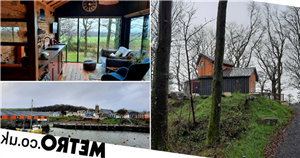Getting a haircut every fortnight has become an integral part of the Black British experience.
Leave it much longer, and you can be in for days of mockery from your friendship group, go more frequently, and you can be marked out as particularly vain – it has to be every two weeks.
When I was younger, around eight years old, getting a haircut was a daunting experience.
My feet would hang from the chair – and I would tremble at the sensation of the sharp, vibrating clippers touching my head.
Sometimes the firm hands of the man cutting my hair would cause me to move uncomfortably.
‘Stay still’ became his go-to command, becoming frustrated at my erratic posture, which made the whole process take longer than it needed to.
I would look in horror at my mum through the mirror in front of me, thinking, ‘Why did she bring me here?!’
In my younger days, that experience was hell on earth.
But as I started to grow older, the negative experience I had with barbers was just a phase that washed away.
I developed relationships with staff and customers that meant we could go back-and-forth on debates, helping me develop and grow as a person.
I no longer regard it as a place of agony and despair, but neither do I see it in practical terms as the place to get my hair cut.
Men, especially Black men, are too often robbed of a safe space to be emotionally vulnerable
A friend of a friend gave me a recommendation for my current barber – and once I met him, my first trim took place with positive energy reciprocated on both sides.
I now see his shop as akin to a community hub – a conducive environment for personal growth, which has a much broader cultural importance for Black men like myself across the world.
I tend to get sorted on a Saturday morning, ahead of going out with friends for the weekend.
Once you find someone that knows their way around the clippers and is trustworthy enough to shape you often, an unspoken pact and a solid mutual understanding is formed.
But it doesn’t stop there: the shops themselves can also turn into a haven for debates, friendships, comedy, and a safe space for emotional vulnerability.
It can become both an outlet and a support group, where you can get some healthy introspection done among your peers or receive some sage advice.
My rapport with my current barber is as long-standing as it is strong.
We’ve had cherished conversations throughout my three years of consistent visits, often leading me to cathartic self-reflection.
I remember when I shared with him how hard I’d been grinding through the summer of 2019. I was in an unhealthy routine, spending every waking second scrolling through and replying to work emails.
But when he posed the question: ‘What are you doing it for?’ I was unable to answer.
Through this simple interrogation of my toxic hustle culture, he was able to get to the root of my problem.
I had recently separated from my ex, and I dealt with it by diving into a relentlessly focussed approach to work, which made me physically and mentally exhausted.
My barber could tell something wasn’t right as soon as I fist-bumped him walking through the door.
Half an hour later, I left his shop with a heavy burden lifted from my shoulders.
Talking about the break-up with a person I trusted profoundly impacted me.
I had only spoken about it to two other people, with such little detail that had you asked them, they would have failed to articulate the actual reason for our breakup.
But opening up to my barber allowed me to reflect on where I might have gone wrong, on the importance of accountability and, most importantly, how I could become the change I wanted to see.
Men, especially Black men, are too often robbed of a safe space to be emotionally vulnerable.
We can be ridiculed and scorned by teachers, religious institutions, colleagues and sometimes even our own family for even mentioning mental health struggles.
Men who hide their problems are thought to be at greater risk of committing suicide – no small problem given that, on average, 12 men take their own life every day across Britain.
In a world in which Black boys and men too often feel pressured by expectations of how much money you have or how much of a man you are on an outdated masculinity scale, the shops can play a nurturing, supportive role in helping young Black men to find and to craft their identities.
A friend of mine refers to getting his haircut as ‘seeing his therapist’.
The cultural significance of this routine has been portrayed as the heart of the Black experience on both sides of the pond.
The Barbershop movie franchise, Pixar’s animation movie Soul, and Channel 4 comedy series Desmond’s all provide a sneak peek into the space where men can be authentically Black and vulnerable.
To think in terms of the barbershop as a mere exchange of services would be a profound error. They are a sanctuary for Black men to share banter, connect, heal, and support one another outside the scrutiny of others. They are truly indispensable.
As we continue to reel from both the ongoing effects of the pandemic and from the surge in the cost of living across Britain – which could affect barbers significantly – we should never forget the significant role that they can play in our individual and collective wellbeing.
Do you have a story you’d like to share? Get in touch by emailing [email protected].
Share your views in the comments below.
Source: Read Full Article




